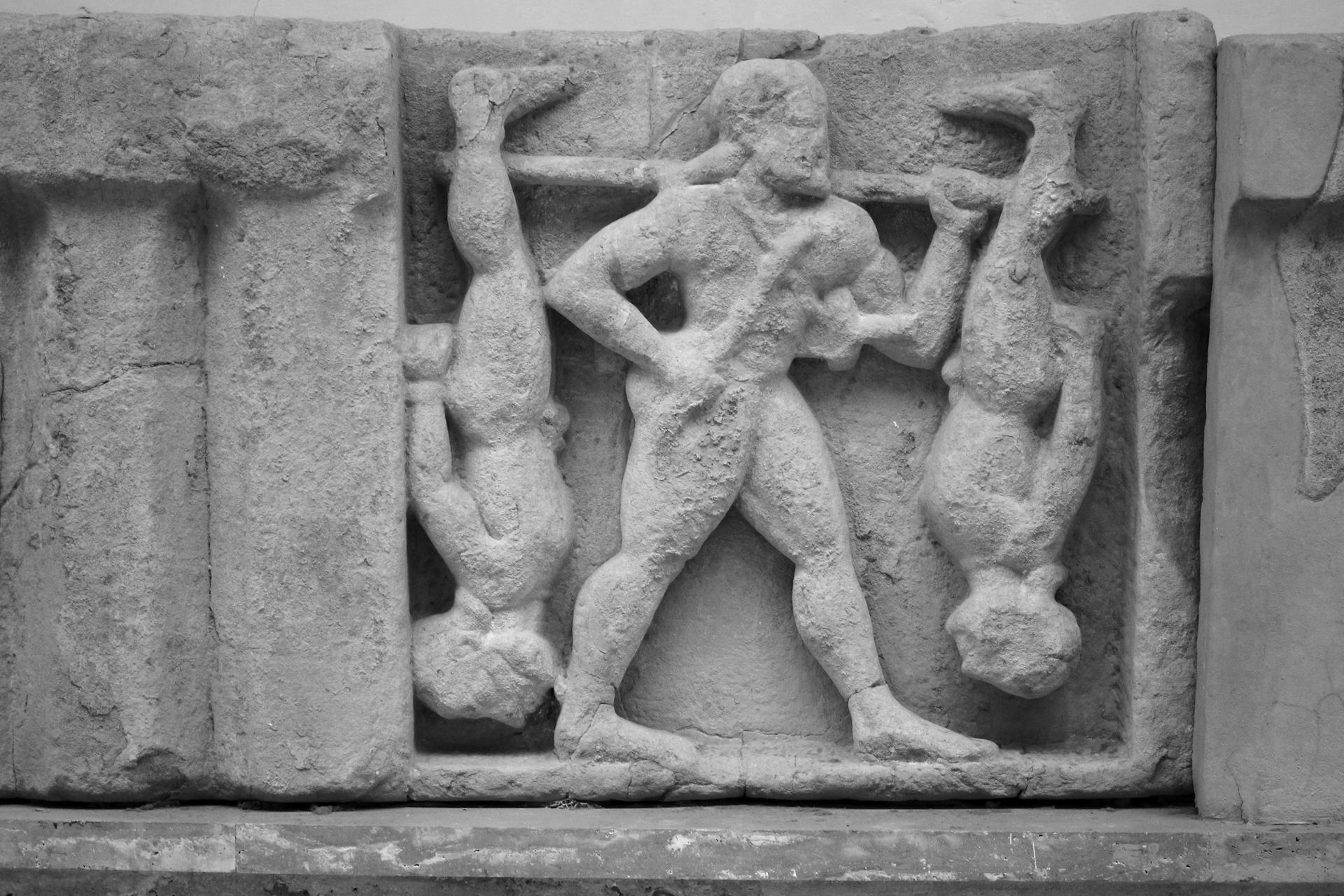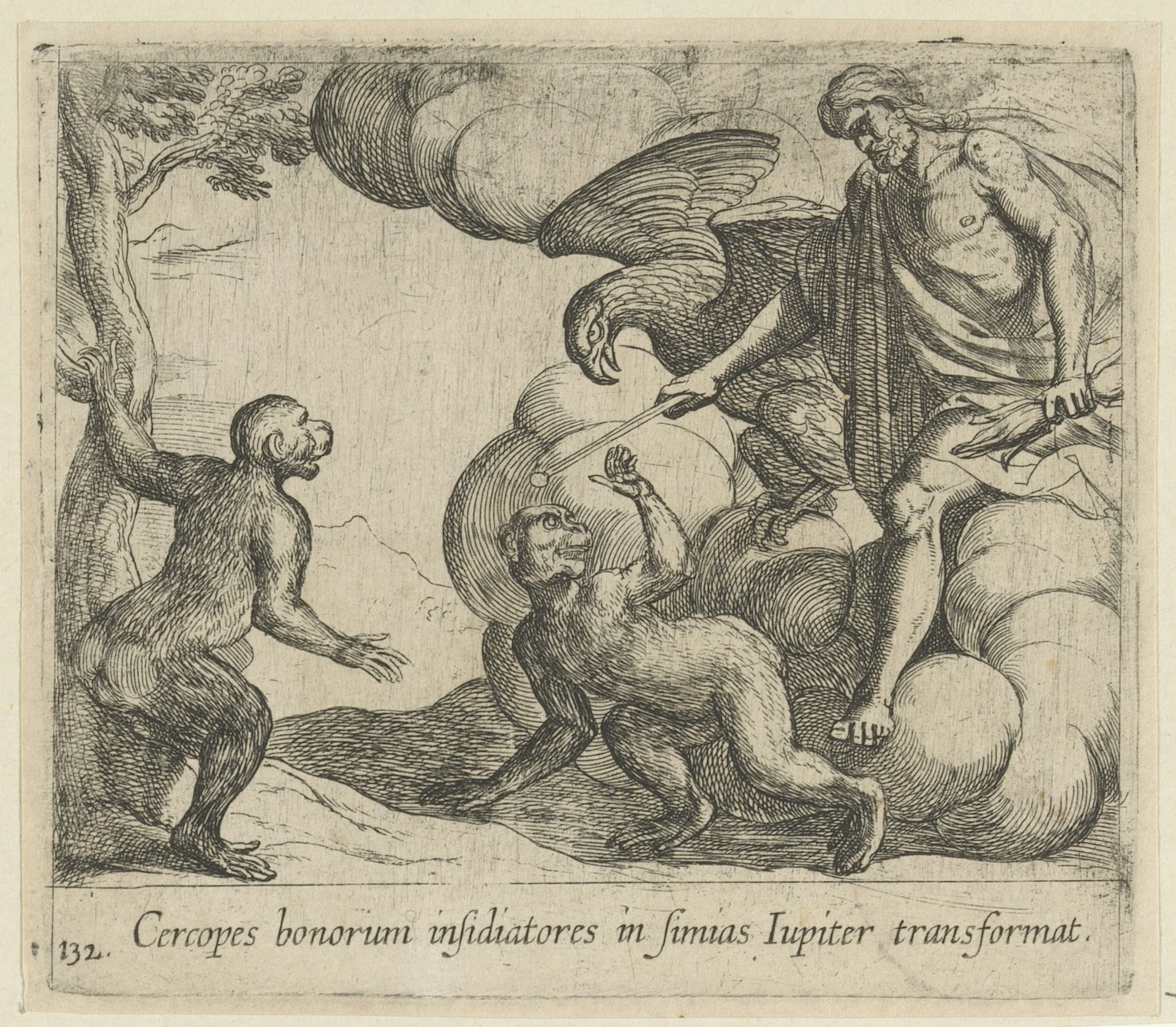Cercopes

Metope from the Heraion at Foce del Sele showing the Cercopes captured by Heracles (second half of sixth century BCE)
VelvetCC BY-SA 3.0Etymology
The name “Cercopes” (Greek Κέρκωπες, translit. Kérkōpes) is derived from the Greek word κέρκος (kérkos), meaning “tail”—perhaps suggesting that they were initially imagined with tails.
Pronunciation
English
Greek
Cercopes Κέρκωπες (Kérkōpes) Phonetic
IPA
[sur-KOH-peez] /sɜrˈkoʊ piz/
Attributes
General
The Cercopes were small, thieving creatures, most often said to have lived somewhere in Anatolia, either at Ephesus[1] or in Lydia.[2] But other sources placed their homeland somewhere in Greece, either on the mainland at Thermopylae[3] or near Oechalia, on the island of Euboea.[4] In one tradition, they were eventually turned into monkeys and moved to a more appropriate home—Pithecusae, or “Monkey Island,” on the western coast of Italy (see below).
Most sources agreed that there were two Cercopes, a pair of brothers, but opinions varied wildly on their names. Some said the Cercopes were called Olus and Eurybatus;[5] others called them Sillus and Tribalus;[6] Andulus and Atlantus;[7] Candalus/Candulus and Atlas;[8] or Acmon/Aclemon and Passalus.[9] One author, Diodorous of Sicily, did not give any names for the Cercopes but implied that there were more than two of them.[10]
Iconography
The Cercopes were quite common in early Greek art, though their popularity waned in later periods. The creatures were often depicted in vase painting and architectural sculpture from the sixth century BCE, with particular emphasis on the story of their run-in with Heracles. They were most often shown bound and hanging upside down on either side of a pole slung over the shoulder of their captor Heracles.
In earlier representations, the Cercopes looked much like ordinary humans, if perhaps a bit smaller. But over time they acquired a more grotesque, monkey-like appearance, with a potbelly, pointed ears, and oversized genitalia.[11]
Family
There were different accounts of the Cercopes’ parentage. In one tradition, they were the children of Theia (one of the Oceanids, not the Titan of the same name) and her father, the Titan Oceanus.[12] But other authors claimed they were the children of a certain Limne[13] or of a daughter of Memnon (whose name is not reported).[14] One source made the Cercopes the children of a woman named Cercope, explaining that this was the origin of their name; but this variant is probably a later invention, the result of poor etymologizing.[15]
Mythology
The Cercopes Meet Heracles
By far the most familiar myth of the Cercopes involved their rather tense encounter with the hero Heracles. In what seems to have been the standard account, this confrontation took place when Heracles was in Anatolia working as the slave of the Lydian queen Omphale (though some sources transferred the myth to Greece). One night, when Heracles had fallen asleep in the woods, he awoke to find the good-for-nothing Cercopes trying to steal his weapons.
Heracles captured the thieving creatures without much difficulty and tied them upside down to a wooden pole, which he then slung over his shoulder. From their vantage point, the Cercopes had a good view of Heracles’ buttocks, which were dark and hairy. Seeing this, the Cercopes started laughing. When Heracles asked what was so funny, the Cercopes explained that, long ago, their mother had told them of a prophecy warning about a man with dark buttocks. Heracles found this so amusing that he let the Cercopes go.[16]
In other versions of the tale, Heracles was commanded to capture the Cercopes by one of his masters, usually Omphale. Some claimed that it was the Cercopes’ mother who convinced Heracles to let the troublemakers go.[17] But in other accounts, Heracles ultimately killed the Cercopes or turned them over to Omphale.[18]
The Cercopes Meet Zeus
In some traditions, the Cercopes eventually became so bold that they tried to deceive Zeus, the ruler of the gods. Unlike his son Heracles, Zeus was not amused by the creatures’ antics. In one account, Zeus punished the Cercopes by turning them to stone.[19] But in another account, he relocated them to Pithecusae, the island of monkeys, and adjusted their form accordingly:
The father of the Gods detesting lies,
Oft, with abhorrence, heard their perjuries.
Th’ abandon’d race, transform’d to beasts, began
To mimick the impertinence of Man.
Flat-nos’d, and furrow’d; with grimace they grin;
And look, to what they were, too near akin:
Merry in make, and busy to no end;
This moment they divert, the next offend:
So much this species of their past retains;
Tho’ lost the language, yet the noise remains.[20]

Jupiter Transforming the Cercopes into Monkeys by Antonio Tempesta (1606)
RijksmuseumPublic Domain